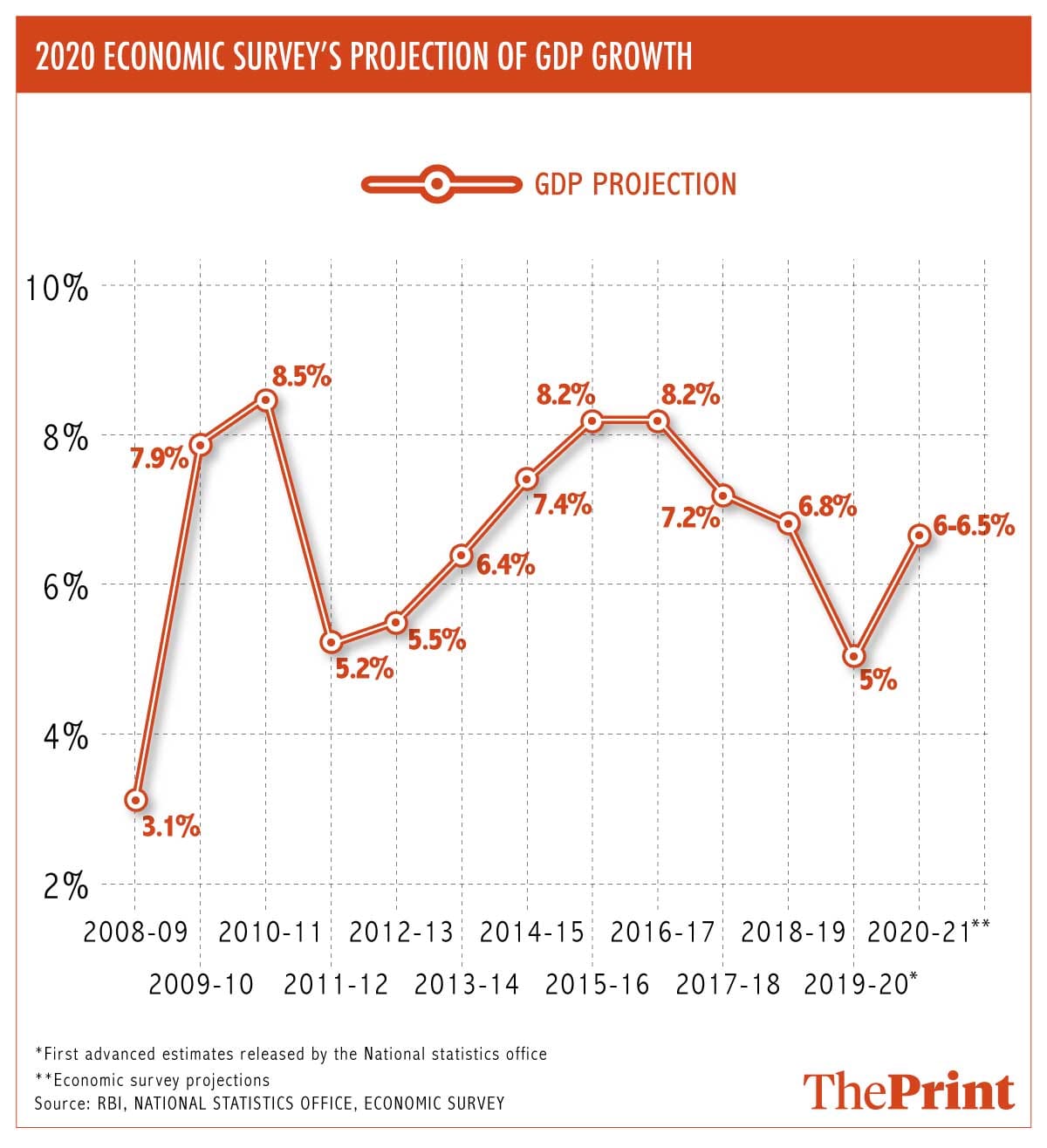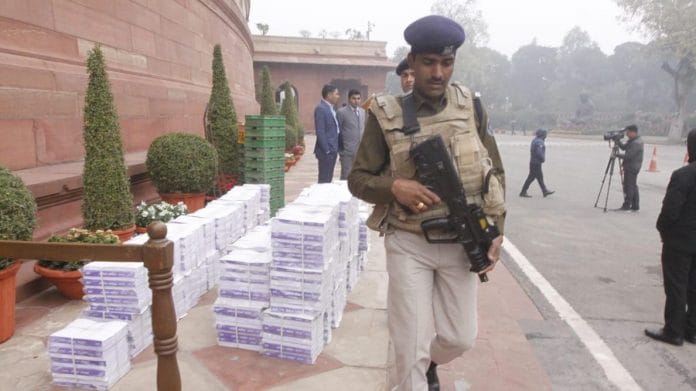New Delhi: The Economic Survey 2020 has projected that the Indian economy will grow at 6-6.5 per cent in 2020-21, as against the revised estimate of 5 per cent for 2019-20.
The projections in the survey authored by a team led by Chief Economic Adviser Krishnamurthy Subramanian come at a time when the sharp slowdown in economic growth seems to have taken the government and the Reserve Bank of India by surprise.
The Indian economy is expected to slow down for the third consecutive year in 2019-20. The growth was 6.8 per cent in 2018-19, down from 7.2 per cent in 2017-18, and 8.2 per cent in 2016-17.
Also read: These are the top 5 officials working behind the scenes on Modi govt’s budget
In a bid to enable the economy to “strongly rebound” in 2020-21, the survey urged the Narendra Modi government to “use its strong mandate to deliver expeditiously on reforms”.
The survey expected the resurgence in growth to begin from the second half of 2019-20.
“GDP growth of India should strongly rebound in 2020-21 and more so on a low statistical base of 5 per cent growth in 2019-20,” the survey said. It added that on a net assessment of both the downside and upside risks, India’s GDP growth is expected to grow in the range of 6-6.5 per cent in 2020-21.
Loosen purse strings
The Economic Survey 2020 favoured a relaxation in the fiscal deficit target in 2019-20 to boost growth and pointed out that cutting down expenditures to compensate for falling revenue may not be ideal.
“Going forward, considering the urgent priority of the Government to revive growth in the economy, the fiscal deficit target may have to be relaxed for the current year,” it said.
“…there is an apprehension that the Tax revenue for the current fiscal year would be muted relative to the target envisaged in 2019-20 BE. The gap due to lower tax receipts could be to some extent compensated by higher mobilisation of Non-Tax revenue and disinvestment proceeds for 2019-20. However, high growth in Non-Tax revenue may not be sustainable year after year,” the survey said.
It added that given the “sluggish demand and decline in growth of private consumption expenditure reported in the first half of the fiscal year, any cut in expenditure, especially capital expenditure would have adverse implications for growth”.
The fiscal challenges will continue in 2020-21, the survey forecast, pointing out there could be a need for counter-cyclical fiscal policy measures to boost growth.
“While on the one hand the outlook for global growth persists to be weak, with escalated trade tensions adding to the risk; on the other hand, the pace of recovery of growth will have implications for revenue collections. In order to boost the sluggish demand and consumer sentiments, counter-cyclical fiscal policy may have to be adopted to create additional fiscal headroom,” it said.
Modi govt’s biggest challenge
The slowdown, led by a fall in both investment and consumption, has emerged as one of the biggest challenges faced by the Narendra Modi government in its six-year rule. The slowdown in growth has also aggravated the fiscal headache for the government.
Nominal GDP growth is expected to grow at only 7.5 per cent in 2019-20, as against the 12 per cent initially estimated. This means that the budgeted target for tax collections is likely to be missed by a substantial margin, increasing the actual fiscal deficit. Economists have pegged the gap to be more than Rs 2 lakh crore.
In addition, a fall in the denominator means that the ratio of fiscal deficit-to-GDP in 2019-20 is likely to be substantially higher than the 3.3 per cent estimated in the budget.
The previous Economic Survey, presented in July last year, had projected that the Indian economy would grow at 7 per cent in 2019-20. But since the projections were made, the economy saw a sharp deceleration. Quarterly GDP growth fell to 5 per cent in the quarter ended June, and to 4.5 per cent in the quarter ended September, from 5.8 per cent in the quarter ended March.

The falling growth has also been accompanied by rising inflation, increasing fears of stagflation, or a situation where stagnant growth is accompanied by rising inflation.
Inflation based on the consumer price index rose to 7.35 per cent in December, breaching the 6 per cent upper limit that is mandated for it.
Also read: Truth be told, Modi’s budget won’t solve India’s economic crisis







Economic Survey story and FM budget story following it, looks like there is contradiction.
Budget economics seems to believe not in Keynesian ,but in indigenous version of the economics of its own
Some of the suggestion of the Swedeshi wing of the BJP seem to be included in FM’s today’s budget for 2020-21.
Results perhaps will very much depend on lot of ground work and implementation aspects,
We should hope for the best.